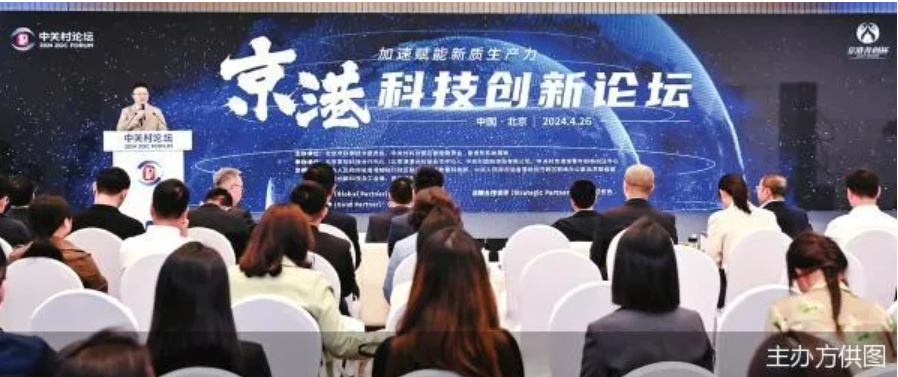A Tale of Two Cities of Innovation: Beijing and Hong Kong
With the rapid development of artificial intelligence, large models, and other technologies, how can Beijing and Hong Kong further deepen their cooperation by leveraging their talent and policy advantages? On April 26, the 2024 Zhongguancun Forum "Beijing-Hong Kong Science and Technology Innovation Forum" and the seventh "Beijing-Hong Kong Youth Innovation Cup" Entrepreneurship Competition Beijing Selection were held at the Zhongguancun Exhibition Center. During the event, numerous guests from both cities discussed topics such as science and technology innovation cooperation and talent development. Over the past two years, cooperation between Beijing and Hong Kong in life sciences, artificial intelligence, and other fields has begun to bear fruit. Additionally, both cities have introduced various policies to foster AI development. To encourage more graduates to start their own businesses, Beijing and Hong Kong have also launched relevant programs to support talent employment and entrepreneurship.

Exploring Innovation Together
Chan Ka-yin, Chief Representative of the Hong Kong Trade Development Council for North and Northeast China, highlighted that Hong Kong's designation as one of the "Eight Centers" can serve as a critical window for developing new quality productivity in the country. He noted that Hong Kong's mature capital market, international business environment, robust legal system, and world-class universities and research institutes attract global capital and top professionals, providing strong support for enterprises entering the international market.
Chan believes that Beijing, with its rich scientific research resources and concentration of higher education institutions and research institutes, has immense potential for cooperation with Hong Kong in talent exchange, creator financing, and the transformation of scientific achievements. Therefore, he suggested that the two cities could strengthen cooperation to jointly promote industrial upgrading and transformation, accelerate the pace of scientific research transformation, and advance the development of new quality productivity.
Over the past two years, Beijing and Hong Kong have seen initial success in their cooperation in areas such as life sciences, artificial intelligence, and robotics. These collaborations have laid the foundation for jointly exploring new application scenarios for innovative technologies. Additionally, at the end of 2021, the Hong Kong Trade Development Council and the Beijing Municipal Science and Technology Commission jointly launched the "Beijing-Hong Kong Science and Technology Co-innovation Platform." This platform is designed to meet the needs of science and technology enterprises in both cities and facilitate cooperation and matchmaking between enterprises.
Artificial Intelligence
Zeng Dajun, Deputy Director of the Institute of Automation at the Chinese Academy of Sciences, views artificial intelligence as a "universal oil" that can extract more value wherever it is applied. He believes China's industrial landscape is particularly suited for developing AI-driven technologies, enabling them to create value across various industries. Judging by the policies introduced by Beijing and Hong Kong, it is clear that both cities place significant importance on developing and applying AI technologies.
In 2023, Beijing issued several special policies, including the "Implementation Plan for Accelerating the Construction of a Globally Influential Artificial Intelligence Innovation Hub (2023-2025)" and "Measures for Promoting the Innovation and Development of General Artificial Intelligence." These policies aim to promote AI technology innovation and industrial development.
Zeng believes that the elevated strategic importance of AI will inject new vitality into Beijing-Hong Kong cooperation. Currently, Beijing and Hong Kong have established numerous funds in the field of technological cooperation. Moving forward, the two cities can further develop through international cooperation and data sharing, creating a scenario where mainland enterprises expand internationally via Hong Kong, and Hong Kong enterprises enter the mainland market through Beijing. This dual-directional partnership will promote mutual progress.
Innovation and Entrepreneurship
In recent years, Beijing and Hong Kong have maintained close exchanges in talent development. In April 2018, the Beijing-Hong Kong University Alliance was established in Hong Kong, comprising 12 universities from Beijing and 8 from Hong Kong. Since its inception, the alliance has seen over 30,000 teachers and students participate in online and offline activities, including 12,500 Hong Kong students and 18,000 Beijing students as of the end of 2023.
Discussing the current state of talent development in Hong Kong, Tse Chi Kong, Associate Vice-President of City University of Hong Kong and Dean of the School of Innovation, noted that the number of startups in Hong Kong increased from 1,500 to 3,300 between 2015 and 2020. Among these startups, 97% of the founders are aged 29-39, 80% are university graduates, and 97% hold a master's degree or higher.
On the same day as the forum, the seventh "Beijing-Hong Kong Youth Innovation Cup" Beijing Selection Competition officially commenced. This year's competition continues to focus on new generation information technology, emphasizing artificial intelligence, the Internet of Things (IoT), smart transportation, big data, the metaverse, unmanned vehicles, intelligent robots, and other technologies within smart city application scenarios.
(This article is translated from "Beijing International Science and Technology Innovation Center" Wechat account, with information from Beijing Business Today.)